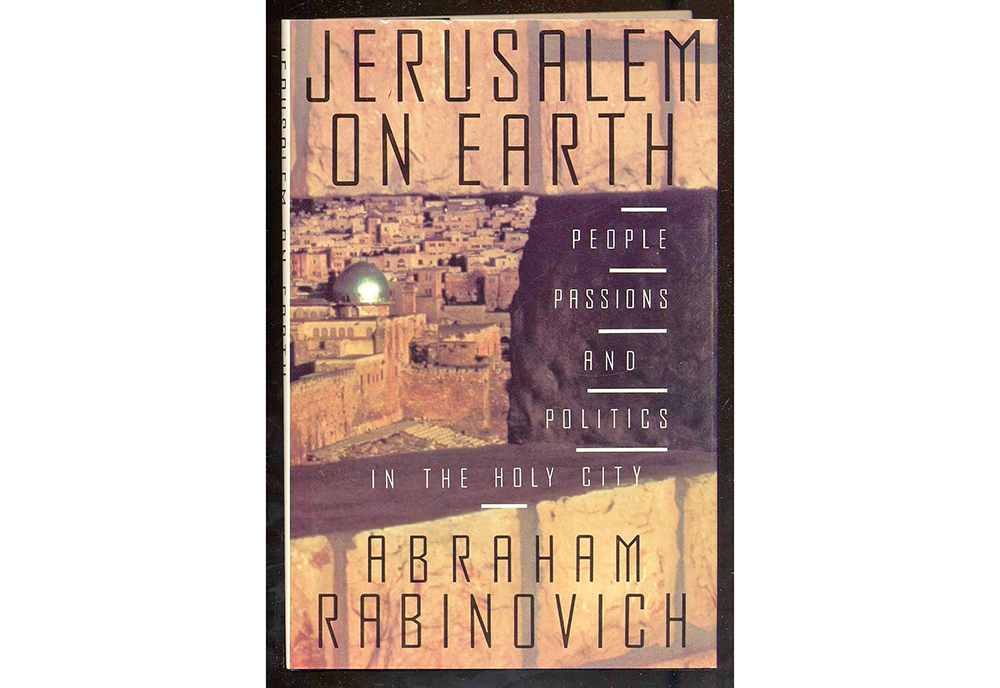
Reviewing: “Jerusalem on Earth: People, Passions, and Politics in the Holy City” by Abraham Rabinovich. Free Press. 1988. Hardcover. 225 pages. ISBN-13:
978-0029257401.
“Jerusalem on Earth: People, Passions, and Politics in the Holy City” is a collection of around 30 short stories, all taking place in the post-Six Day War period in Jerusalem. The book paints a broad mural of the unique personalities that make Jerusalem one of the holiest and most special cities in the world.
The book is written by Abraham Rabinovich, a former journalist. Rabinovich was born in the Lower East Side of New York City and worked as a reporter for multiple New York area newspapers including Long Island’s Newsday. He traveled to Israel in 1967 to cover the Six Day War and subsequently decided to stay, joining the Jerusalem Post where he worked for 25 years.
For most of his time working at the Jerusalem Post, Rabinovich worked the municipal and police beats, giving him a unique view of the day-to-day bustle of Jerusalem life. When I met Rabinovich a few weeks ago in a Jerusalem cafe, it was clear that his inquisitive personality shines brightly.
Rabinovich’s series of short stories all take place from the 1960s through to the 1990s, a time dominated by iconic Jerusalem mayor Teddy Kollek. Political aficionados and history buffs will enjoy reading about Kollek’s powerhouse and refreshing approach to political and urban management that treated all of Jerusalem’s citizens as equals.
This message of hope is carried throughout the book. “Jerusalem on Earth” begins and ends with a touching story of two families, one Arab and one Jewish, in Abu Tor, a then-divided neighborhood just south of the Old City. The stories relate how both families extended their arms in peace to get to know the “other side” better and learn more about each other’s culture.
The message is clear, that despite experiencing hardships and finding themselves in a scary new world, these families still found a way to live together in peace and harmony. An ideal that feels very far away today.
In fact, “Jerusalem on Earth” offers something for everyone. If you come from a religious background, you’ll be interested in Rabinovich’s retelling of the shidduch process inside Meah Shearim. If you’re fascinated by the inner dynamics of the Haredi population, it’s worth reading the book to learn about the conflicts between the Belz and Eda Haredit communities.
There are also heart-wrenching stories, such as the Missing Persons’ Bureau, a government department specifically set up to reunite lost relatives, especially those whose families came to Israel following the Holocaust and the dissolution of the Soviet Union. The book also tells the tale of a tragic homicide at a nunnery on the outskirts of Jerusalem.
Along the way, readers will meet some simply astonishing characters. There’s the Muslim Talmudist, a journalist who translated Mishnayot into Arabic and was later honored by the Jerusalem Municipality. It is easy to argue that World War III was prevented when an Australian tourist tried but failed to burn down the Temple Mount. The tale of a pop star turned ultra- Orthodox rabbi is an interesting look at how our lives can change in the most unexpected ways.
Overall, “Jerusalem on Earth” is a portrait of the holy city. It is clear that Rabinovich breathed the heart and the soul of the city, searching out the nuances and unique characteristics that are intrinsic to Jerusalem. Yet, he sees the bigger picture. The book is framed in the wider geopolitical framework necessary to appreciate the beauty. While “Jerusalem on Earth” is not a love letter to Jerusalem, it is an accurate reflection of its beauty.
It is important to note that the book reflects the reporting and language of its time period. Readers should be conscious of language used in the13th chapter, referring to children with disabilities, which may be upsetting to some.
Daniel Davis is a senior account executive at FINN Partners, a communications firm with offices on three continents. He lives with his wife in Jerusalem.









